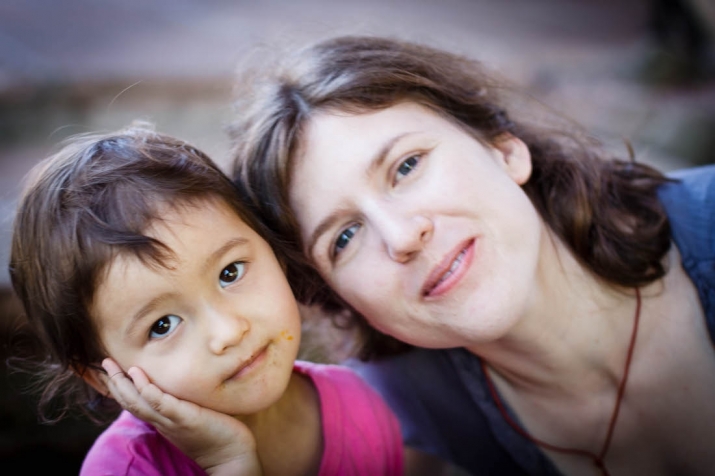FEATURES|COLUMNS|Buddhist Parenting (inactive)
Rainy Day Contemplations on Suffering
 Mother and daughter. Photo by Mauria Sabbado
Mother and daughter. Photo by Mauria SabbadoIt’s pouring with rain outside and my youngest daughter is in bed with a fever. I thought that we had escaped southern Brazil’s winter flu viruses, but now they seem to have come all at once. My husband and I look like zombies after a series of sleepless nights taking temperatures and calming our restless daughters. Yesterday, as I dialed the doctor’s number, I donned a tired frown and my eldest daughter, Amaya, who was watching me unbeknownst said in a loud voice, “Suffering?!” I looked up and saw her serious little face gazing at me and had to relax. “I’m a little worried but it is just flu . . . a little suffering,” I replied. It actually made me laugh; I wasn’t sure if she was making a statement or asking a question.
Oddly that moment helped me to recall the teachings and reflect on the first of the Four Noble Truths communicated by the Buddha, the Noble Truth of Suffering. Instead of being focused on my own stress and worry, I tried to remember that discomfort is part of being in Samsara. Moments of discomfort can serve as reminders to recall the teachings and meditate on them, which I tried to do between phone calls. As a lay Buddhist practitioner, I have to use what comes up in daily life as fuel for contemplation and practice since it can often be challenging to find the time for extensive study.
I have moments when I feel as though my maternal urge to protect my children could somehow defy reality; finding a way to rid our children of any chance of discomfort. And yet it’s obvious that this is not possible and is a losing battle. At one point, feeling a strain on my marriage from the new dynamics of parenthood, I went to a Buddhist teacher for advice. I explained that I was worried our marital stress would in turn create stress for little Amaya. The teacher replied with great warmth, “Don’t worry, this is nothing compared to what she will face in samsara (cyclic existence).”
That honest statement was like a hard wakeup call and I thought, “Oh right, the Truth of Suffering: remember, everyone will experience sickness, old age, and death, among other sufferings—my children included!” I felt a shift in my perspective, almost like the difference between being concerned with feeling good and being concerned with finding an actual cure for ailments. I found myself wondering how I could help prepare my children to face discomfort, loss, and all the changes and challenges that life brings. I looked once again at my own example and felt that I could be more honest and more patient with life’s discomforts, since they are inevitable.
 Dharmachakra (Wheel of the Dharma) symbolizing the Buddhas teachings. Photo by Mauria Sabbado
Dharmachakra (Wheel of the Dharma) symbolizing the Buddhas teachings. Photo by Mauria SabbadoSometimes I find myself comforting my children when they are unwell or upset, saying, “Everything will be okay.” I recently caught myself saying it again and thought that, depending on the context, this statement could be really misleading. Now I try to rephrase a little: “It won’t last, soon you’ll feel different.” I think most of us have used a phrase like the first one to comfort a friend, family member, or child. But is it realistic? In What the Buddha Taught (Oneworld Publications 1959), Walpola Rahula emphasizes that the Buddha was a realist and an honest teacher, neither pessimistic nor optimistic. I hope to somehow emulate the Buddha’s grounded honesty as a parent.
When we think about it, is suffering really such a bad thing? We have to acknowledge the truth of suffering to understand the following truths: the origin of suffering as craving, its cessation in abandoning craving, and the way to cessation. Knowing suffering makes the path to enlightenment possible. Also, most of us begin our search for a spiritual path as the result of some kind of difficult encounter with suffering. These encounters encourage us to ask insightful questions and often, through our pain, we are able to connect more deeply with the pain of others. Hardship can be one of our greatest teachers.
I hope that as my daughters get older they can relate more and more to the Four Noble Truths and will hopefully find guidance in the Noble Eightfold Path,* taught as the way to cessation, even if they choose very different lifestyles than my own. Ultimately, the Buddhist path leads to freedom from suffering, but trying to avoid suffering won’t help us attain liberation. So, while I continue to be a protective mother, contemplating in this way helps to diminish my fear for their future hardships. It also helps me remember to enjoy life and take the time to be playful with my children. By being more realistic, I hope to confront the denial of suffering, which inevitably creates greater discomfort over time.
And again things change. . . . Now Leela’s fever has eased and she is playing quietly. Amaya is practicing reading without coughing. A fire is burning brightly in the wood stove and the house feels warm. The flu seems to be passing and soon we will be in the next moment.
* Right understanding, right thought, right speech, right action, right livelihood, right effort, right mindfulness, and right concentration.














